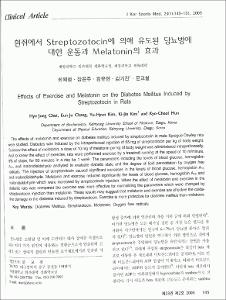흰쥐에서 streptozotocin에 의해 유도된 당뇨병에 대한 운동과 melatonin의 효과
- Keimyung Author(s)
- Mun, Kyo Cheol
- Department
- Dept. of Biochemistry (생화학)
- Journal Title
- 대한스포츠의학회지
- Issued Date
- 2005
- Volume
- 23
- Issue
- 2
- Abstract
- The effects of melatonin and exercise on diabetes mellitus induced by streptozotocin in male Sprague-Dawley rats were studied. Diabetes was induced by the intraperitoneal injection of 65 mg of streptozotocin per kg of body weight. To know the effect of melatonin, a dose of 10 mg of melatonin per kg of body weight was administered intraperitoneally. And to know the effect of exercise, rats were performed exercise by a treadmill running at the speed of 10 m/minute, 8% of slope, for 60 minutes in a day for 1 week. The parameters including the levels of blood glucose, hemoglobin A1C, and malondialdehyde analysed to evaluate diabetic state and the degree of lipid peroxidation by oxygen free radicals. The injection of streptozotocin caused significant increases in the levels of blood glucose, hemoglobin A1C and malondialdehyde. Melatonin and exercise reduced significantly the levels of blood glucose, hemoglobin A1C and malondialdehyde which were increased by streptozotocin injection. When the effect of melatonin and exercise in the diabetic rats was compared the exercise was more effective for normalizing the parameters which were changed by streptozotocin injection than melatonin. These results may suggest that melatonin and exercise are effective the oxidative damage in the diabetes induced by streptozotocin. Exercise is more protective for diabetes mellitus than melatonin.
- Alternative Title
- Effects of Exercise and Melatonin on the Diabetes Mellitus Induced by Streptozotocin in Rats
- Keimyung Author(s)(Kor)
- 문교철
- Publisher
- School of Medicine
- Citation
- 최혜정 et al. (2005). 흰쥐에서 streptozotocin에 의해 유도된 당뇨병에 대한 운동과 melatonin의 효과. 대한스포츠의학회지, 23(2), 145–151.
- Type
- Article
- ISSN
- 1226-3729
- Appears in Collections:
- 1. School of Medicine (의과대학) > Dept. of Biochemistry (생화학)
- 파일 목록
-
-
Download
 oak-bbb-2114.pdf
기타 데이터 / 2.21 MB / Adobe PDF
oak-bbb-2114.pdf
기타 데이터 / 2.21 MB / Adobe PDF
-
Items in Repository are protected by copyright, with all rights reserved, unless otherwise indicated.